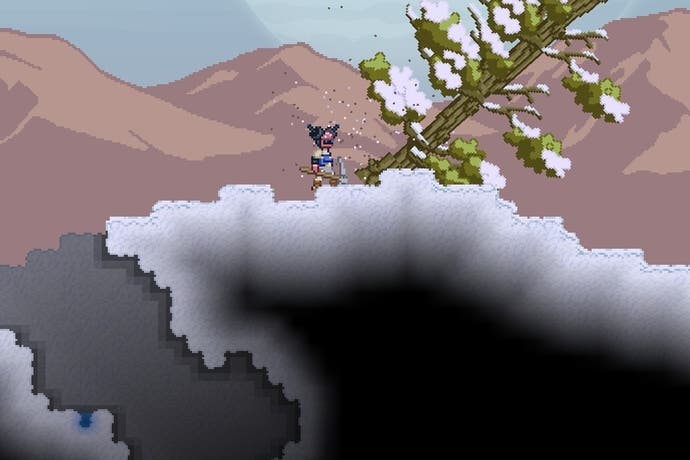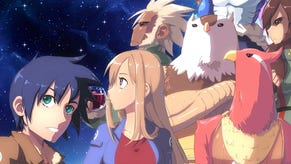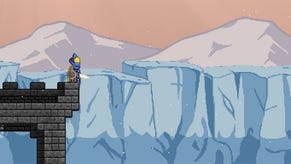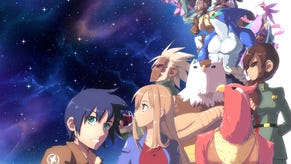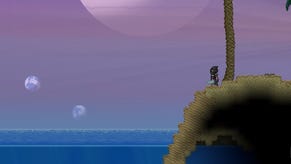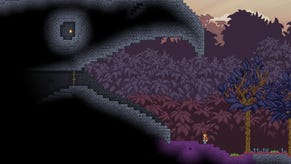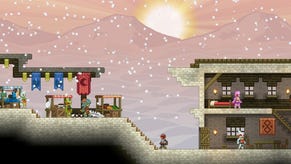Starbound beta review
Watch the skies.
My first planet was a beauty. I beamed down to a bright alien installation filled with money boxes and secret passages, while behind me claret-covered hills rose above forests in which every tree looked like a human brain. The wildlife was aggressive but puny; I could be a king here, and I was, I was! I drilled the mineral guts out of the place and felled all those trees. I built useful gear and fought a UFO loaded with penguins, and then I moved on leaving little but rubble. I never looked back.
My second planet was an ice world. I froze after a few short steps and died. My riches wouldn't protect me, because I'd crafted nothing to keep me warm, and my third planet was ever worse. A moon: a stubbly piece of rock, no atmosphere and the place was colder than hell. It was filled with natural treasures, though: fabulous ores winking at me through the compacted strata of grey dust. I could be richer than a king if I ever found a way to survive here. Richer than a million kings!
Starbound is a lot like Terraria when you get in really close. It offers a procedural - and destructible - 2D environment in which almost everything wants to kill you and where you'll only survive by scavenging your way up the food chain. Mine ores and gather wood, build tools and a shelter - then build a means of building better tools and better shelters. Grow stronger by growing more knowledgeable, and watch as each trip outwards takes you further, earns you more, and leaves you alive that bit longer. Fight, craft, thrive! The UI's not entirely dissimilar, the mouse-and-keyboard controls will feel familiar, and many of the incidental details between both games mesh rather harmoniously, too.
There's one difference, though, and it's a big one. This is Buck Rogers, not Robinson Crusoe, and the first planet the engine offers up to you is only that. It's the first of many. The first of thousands. Fight, craft, thrive, travel!
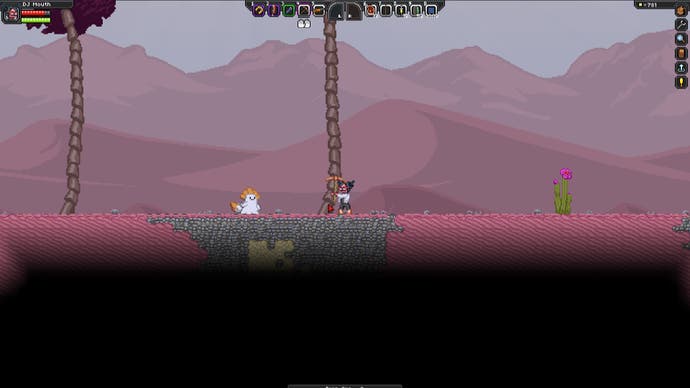
It's a tantalising prospect, then, and Starbound's delivering on its core promises even in its early access incarnation. Eventually, this game could be truly magnificent: vivid worlds filled with buried secrets, with spaceship combat and large-scale planet modification, while the whole adventure will be stitched together with story missions. For now, you get a huge universe divided into sectors of escalating ferocity, a handful of tutorial quests, four bosses to invoke and destroy as you progress, and then you're largely on your own as you craft your way towards Impervium gear. Who cares? You can still make tools and weaponry and clamber up the technology tiers, you can still dip into expansive lore and you can still explore the stars alone or with friends. You'll just have to set your own objectives - and for a game like this, that's hardly a problem.
So how does it play out at present? To answer that, let me tell you about my first day with Starbound - back on that planet where the trees were brains and the alien installation was waiting for me whenever I beamed down. As soon as I landed, I set off to explore, and, after a few minutes walking, I discovered my first major surprise: many of Starbound's planets aren't actually that big, and they eventually wrap around. For a Terraria player, a short jaunt like this felt like sacrilege. I was instantly restless, so I decided to head elsewhere.
Your base in Starbound isn't a planet at all - even though you can designate a planet as your home, which means you'll always be able to beam back to it no matter how far you travel in the galaxy. Your true base is actually a spaceship, distinct for each of the six races you pick between at the start. (From pixel-art bird-people to pixel-art plant-people, these races all look wonderful, even if really meaningful differentiation is pretty thin on the ground at present.) I was a Glitch - the robot guys - so I had a kind of golden castle to zip through the cosmos in. Now I wanted to take it to alien worlds! Alien worlds unlike the one I'd just jogged around, that is, because I'd been there, done that, razed the forests, etc.
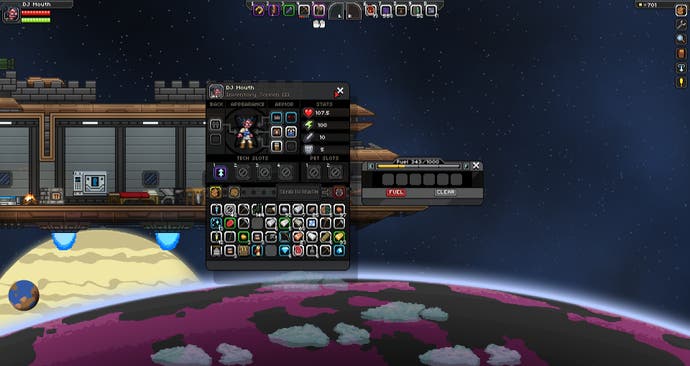
I had no fuel in the tank, though. So I went back down to the alien installation, and this time I started to go through the brief sweep of story missions that are currently available. These teach you the basics of gathering resources, first with a matter manipulator - dependable but slow - and soon with a series of metal axes you construct for yourself. Then they teach you about crafting stuff, like weapons and tools and armour. As with Terraria, you're going to spend a lot of the early game felling trees for lumber, making workbenches and foundries, and paging through the lists of trinkets and doodads you can create with them. It's a grind and there's no ducking that. Nothing you're doing at this point is actually that much fun in itself. What keeps you playing is the promise of the future - the promise of the next five minutes and what you'll have by then that you don't have now.
Along with swords and axes and crafting benches, you'll also need a campfire early on, because you can freeze to death in Starbound. And you'll need to shoot some animals with a bow to make food, because you can starve to death, too. There's a busy chain of things you have to build upfront, actually, and the missions currently climax with the construction of a distress beacon, which costs an awful lot to make. It certainly seems like an awful lot the first time you shell out for it, anyway.
A distress beacon! This was my ticket to space, surely? I dug through the earth, scavenging what I needed for it. I found underground caverns and discovered - painfully - that the core of this particular planet was molten lava. Finally I had enough ore to build that beacon. Ignoring some crucial warning text, I fired it up, and a UFO piloted by penguins immediately appeared and decimated me. Oh, and the beacon itself blew up too.
The beacon doesn't get you onto other planets, then. Stuff like coal gets you onto other planets - coal which I'd already dug up in vast quantities, and which can be smelted in vaster quantities from lumber. The beacon summons the game's first boss and, if defeated, the first boss drops an item that allows you to build a new, fancier kind of crafting table, opening up what amounts to the game's second tier of tech and filling out the starmap with a new sector and slightly nastier threats.
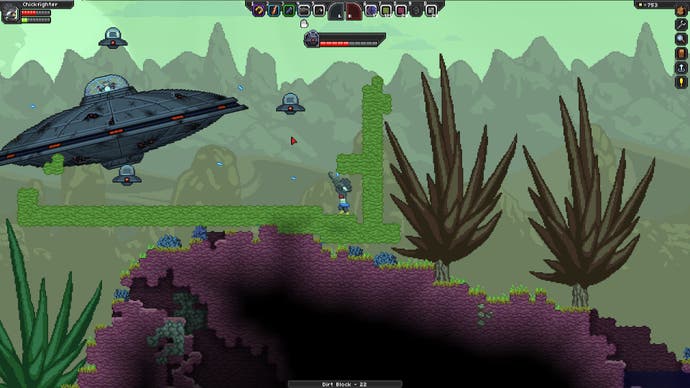
I could have found all this out in advance if I'd checked the wiki - and spending all that time and energy on a beacon that just exploded and summoned my doom should have been infuriating. Here's the thing, though: it wasn't infuriating. It was wonderful. It gave me the impetus I needed to stock up on supplies, get some decent UFO-defeating weaponry together, gather enough material for a second beacon, and then fell that boss and start making a name for myself in the galaxy. Only then did I shovel in coal back on my ship. Only then did I head off to find the world where I froze, the moon where I froze, an asteroid cloud where I also froze - what was I thinking there? - and beyond that desert worlds, jungle worlds, and forest worlds where the rain came down and poisoned me as it fell.
By this point - frozen and dying from the poison rain - I was hooked, and I think you will be too if you give Starbound your time. This mining-and-crafting sort of game is so well suited to early access development because the basics either work or they don't, and then everything that gets piled on top just adds to the richness. Starbound's by no means finished yet but the basics definitely work. There's already loads for you to do, regardless of whether you're trying to work through the tiers and fight all the bosses or if you just want to hop across space, moving from one planet to the next as fuel supplies allow, seeing what you can see and finding what you can find.
Not everything in here's brilliant, of course. Alongside a few irritating omissions - you can buy loot from vendors but there doesn't appear to be a means of selling it other than by grinding ore into money, for example, while the multiplayer server connection set-up is functional but basic - combat is a bit of a letdown. Indigenous aliens on every planet you visit run at you and you run at them. You hit them with your melee gadgets and they blast at you with their procedurally awarded powers, and then eventually one of you dies. Maybe you have a brilliant sword or a shield and it's all over in seconds. Maybe you have a bow or a gun, and you shoot at the aliens from a distance. Either way, it's not very tactical yet, and it isn't, in truth, very interesting either - not even with chums around.
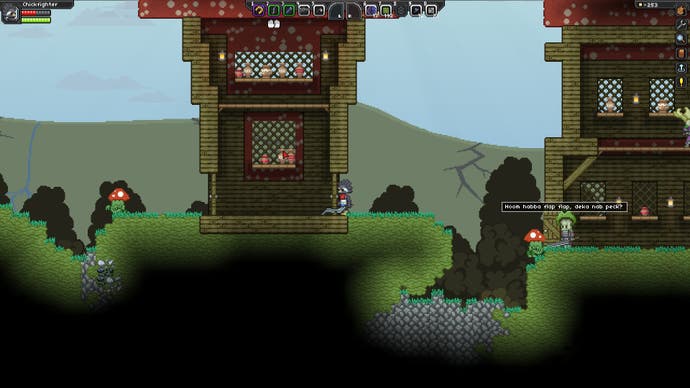
Still, this, and a dozen other little annoyances, are made up for by the things that Starbound already gets so right. How's this, for example? On a sandy planet I came across a medieval fortress. Dungeon structures like this - and like tombs, keeps, futuristic prisons - are scattered all around the cosmos, and they bring just the right level of designer-management to an otherwise procedural space. They give you a more organised landscape to explore every now and then - a nice break from rambling over hills, chipping away at steep cliffs and following cave mouths down into the darkness in search of really great ore.
My medieval castle was filled with robot knights. And, once I'd killed them all, I discovered it was also filled with loot - money (you're docked a little each time you die, unless you're playing permadeath), fancy furniture for any base I might build, and weapons like an amazing fish sword that absolutely shredded all the monsters I came across.
(Speaking of monsters, while the combat's a letdown, the things you're fighting against aren't. Starbound doesn't just procedurally generate worlds, it procedurally populates them, too - and it's astonishingly good at it. I've seen jumping spiders with luminous green spines, pink cloud rabbits with six eyes each, coelacanths made of bubble gum and long-beaked birds that dropped tumbling rocks on me that bounced and then exploded. The real genius of the system, though, is that these animal races are born friendly or born aggressive - they'll either attack or they won't. For some reason, the algorithms that create all this seem to be a little perverse, as well. You'll wade past hordes of dagger-toothed horrors with burning eyes and spikes on their backs and they won't so much as cough in your direction. Then, around the next bend, you'll be torn to pieces by Moomins. The cuter something is, the more I've learned to dread it.)
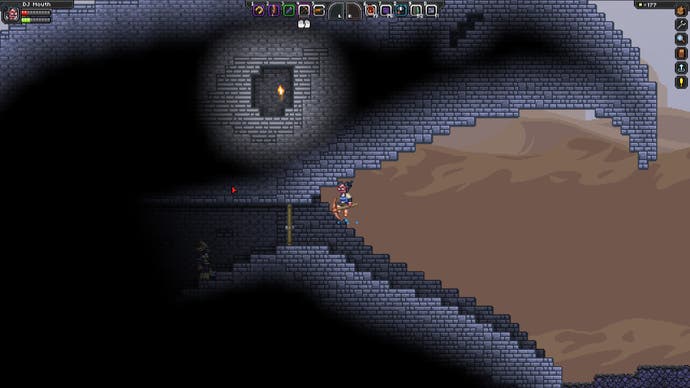
What will you find out there? Either way, beyond your early adventures lies an infinity of crafting, shaping, building, plundering. Make a base out of gold bars, fill it with Egyptian sarcophagi and then lose track of the place while hopping between worlds and start all over again. Bring friends and engage in group terraforming! Bring friends and engage in group warfare. Jump onto a server populated with strangers and see how long you last. The strength of these kind of games is that, after a while, they're whatever game you want them to be. They're places that have been designed for you to get lost in.
And, for a game so closely linked to another, Starbound already cuts a very different figure to Terraria. Terraria's about exploring a single place that gets stranger and richer as you pull back the layers. A lot of Starbound's planets are fairly simple at present - you can walk around them, dig down to their cores and feel like you've got the measure of them completely. Here the richness comes as you hop between one planet and the next: although you still have all the same tools and most of the same objectives, there's a gentle nudge from being a settler towards being an explorer. I'm a homesteader in Terraria but I'm a locust in Starbound, stripping away a world's resources and then disappearing into the sky again. I'm basically the things that freak President Whitmore out so badly in Independance Day.
Yet Starbound still has the ability to create the same interlocked chains of distraction that define Terraria and Minecraft and any other good exploration game. You know: you went out looking for copper, but got sidetracked by a promising cave, and then sidetracked within that cave and then sidetracked again. It's the same story when I look at the wikis - this builds that, and then that drops this other thing when defeated? It's the same when I sit in my ship paging through the starmap that allows me to move between one planet and the next, so long as I have enough fuel.
I'm hours and hours in and I'm still seeing new things. What's more, just yesterday a patch was released which added permadeath mode, a drop-everything-when-you-die mode, new monster attacks, more techs (these work as special abilities), a savannah biome, landmines, and loads of other bits and pieces.
It also wiped my character - possibly the last time this will happen - and left me back at the start once more. A total reset, and yet I still didn't really mind. I've spent the time since gathering ore again, exploring new worlds again, crafting, killing, and defeating that UFO boss again. The place still feels limitless. There's probably so much crucial stuff I've missed in Starbound because I simply haven't come across it, or I haven't pursued it when it first presented itself.
No matter - I'll get to it later as this fascinating game continues to cruise through early access. Today I'll just settle by the campfire on my latest world - arid, jumping critters, yet to see a tree of any description - watching the flames send little red embers fluttering into the night sky. Below me, a fortune in ores. Above me, a universe of stars, each with its own systems, its own moons and asteroids. This'll do nicely. For now.
Eurogamer's alpha and beta reviews are reviews of games that are still in development but are already being offered for sale or funded by micro-transactions. They offer a preliminary verdict but have no score attached. For more information, read our editor's blog.
